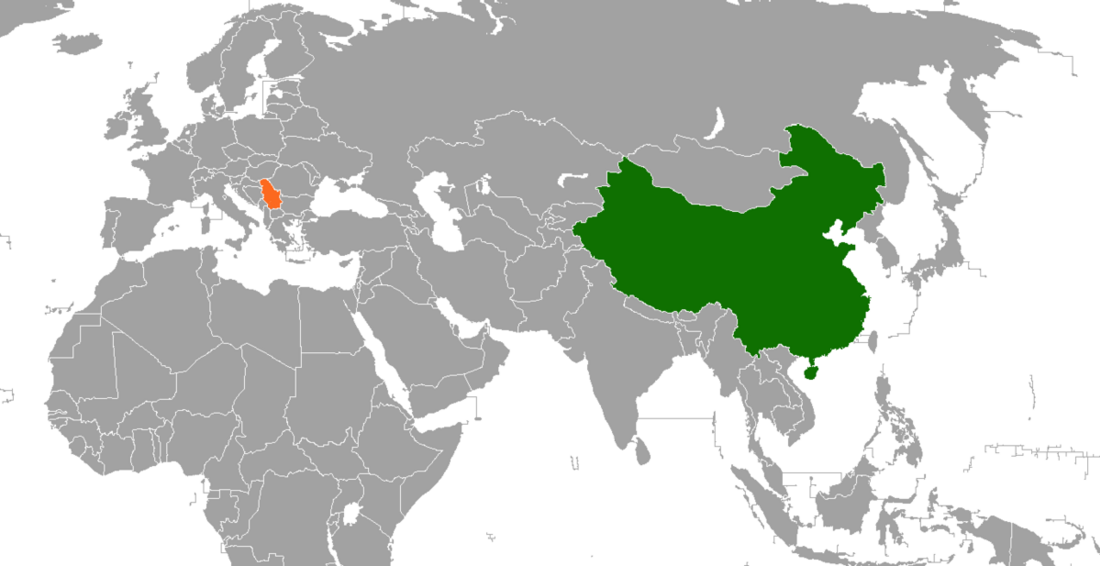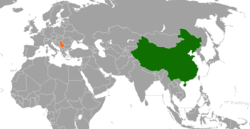Top Qs
Timeline
Chat
Perspective
China–Serbia relations
Bilateral relations From Wikipedia, the free encyclopedia
Remove ads
China and Serbia maintain diplomatic relations established between People's Republic of China and SFR Yugoslavia in 1955. From 1956 to 2006, China maintained relations with the Socialist Federal Republic of Yugoslavia (SFRY) and the Federal Republic of Yugoslavia (FRY) (later Serbia and Montenegro), of which Serbia is considered shared (SFRY) or sole (FRY) legal successor.[1] In recent decades, the two countries have held a very close relationship raising it to the level of strategic partnership since 2009.[2][3][4]
Remove ads
History
China supported the Serbia (then part of Federal Republic of Yugoslavia) during the Kosovo War and opposed the NATO airstrikes against targets in Serbia and Montenegro.[5] China believed that Milošević was acting to prevent the secession of Kosovo by Albanian separatists from Serbia, and thus supported his actions as preserving the FRY's territorial integrity.[6] China opposed NATO intervention in Kosovo on the basis that it set a dangerous precedent that Chinese officials believed could in the future afflict China should riots occur in Tibet or Xinjiang and then result in bombings.[6] PRC opposition to the NATO actions intensified after the United States bombed the Chinese embassy in Belgrade during the war.[5]
Remove ads
Political relations
Summarize
Perspective
Under president Aleksandar Vučić, Serbia has sought closer cooperation with China.[7] After meeting with Chinese Minister of Foreign Affairs Wang Yi, he secured Chinese help in combating the COVID-19 pandemic in Serbia through the delivery of PPE and CoronaVac vaccine doses,[8] which contributed to Serbia leading COVID-19 vaccination rates in Europe.[9][10]
In 2019, UN ambassadors of 37 countries, including Serbia, signed a joint letter to the United Nations Human Rights Council defending China's persecution of Uyghurs.[11][12] Serbia was one of 16 countries that defended China in 2019 but did not do so in 2020.[13]
In 2024, on occasion of the 25th anniversary of the United States bombing of the Chinese embassy in Belgrade, Chinese leader Xi Jinping wrote an article in the Serbian newspaper Politika in which he stated, "The friendship between China and Serbia which is soaked in blood that the two peoples spilled together has become a joint memory of the two peoples and will encourage both parties to make together huge steps forward."[14]
China's stance on Kosovo

China backs Serbia's position regarding Kosovo. The Ministry of Foreign Affairs of China has made a statement stressing that the PRC "expresses grave concern" over Kosovo's unilateral declaration of independence. The spokesman Liu Jianchao's remarks go on to add that "The resolution of the Kosovo issue bares [sic] on peace and stability of the Balkan region, the fundamental norms governing international relations as well as the authority and role of the UN Security Council. China always believes that a plan acceptable to both Serbia and Kosovo through negotiations is the best way to resolve this issue. The unilateral move taken by Kosovo will lead to a series of consequences. China is deeply worried about its severe and negative impact on peace and stability of the Balkan region and the goal of establishing a multi-ethnic society in Kosovo. China calls upon Serbia and Kosovo to continue negotiations for a proper resolution within the framework of the international law and work together to safeguard peace and stability of the Balkan region. The international community should create favorable conditions for that."[15][16]
Serbian Deputy Prime Minister Božidar Đelić told reporters after an April 2009 meeting in Beijing with Politburo member Liu Yandong that China reiterated its support to help Serbia preserve her territorial integrity. "Just as Serbia supports the one China policy, China supports Serbia as its best and most stable friend in southeastern Europe."[17] Ambassador of China to Serbia, Wei Jinghua, stated in 2009 that "China respects the sovereignty and territorial integrity of Serbia and understands the great concern of Serbia on the issue of Kosovo. We support the negotiations between Belgrade and Pristina that would bring a mutually acceptable solution, in accordance with international law, the UN Charter and UN resolutions."[18]
High-level visits
Remove ads
Economic relations
Summarize
Perspective
China is Serbia's second biggest trading partner. Trade between the two countries amounted to $6.1 billion in 2022 with Chinese merchandise exports to Serbia standing at almost $5 billion while Serbian exports stood at $1.1 billion. Since 2024, China and Serbia have a free trade agreement.[14]
Chinese companies invested $5.6 billion in Serbia in the last decade.[19][20] Chinese corporations making investments in Serbia include Zijin Mining (owner of Serbia Zijin Bor Copper cooper mining complex in Bor), Hesteel (owner of Hesteel Serbia steel plant in Smederevo), Hisense (electrical appliances factory in Valjevo), Linglong Tire (tire factory in Zrenjanin), and Minth (automotive parts factories in Šabac and Loznica).
Since early 2010s China has invested US$10 billion in Serbian infrastructure and energy mainly through China's Belt and Road Initiative, of which Serbia was one of major beneficiaries with projects including Serbian section of the Budapest–Belgrade railway (built by CCCC), 350 MW B3 unit of Kostolac thermal power-plant (built by CMEC), Belgrade–Ljig and Čačak-Požega segments of A2 motorway (built by Shandong Gaosu Group), Pupin Bridge in Belgrade (built by CRBC).[14][21] As of 2024, Chinese companies are building several large infrastructure projects including Line 1 of Belgrade Metro (built by Power China), the National Stadium and exhibition halls for Expo 2027 in Belgrade (built by Power China), A6 motorway connecting Belgrade and Novi Sad through the town of Zrenjanin (built by Shandong Gaosu Group).
The Serbian flag carrier Air Serbia operates flights between Belgrade and Shanghai and Belgrade and Guangzhou.[22][23] The Chinese carriers China Southern Airlines and Hainan Airlines operate flights between Belgrade and Guangzhou and Belgrade and Beijing respectively.[24][25]
Military cooperation
In recent years, Serbia has purchased from China air defense missile systems of medium and short range (HQ-22 and HQ-17) as well as combat drones (CH-95 and CH-92).[26] In 2025, Serbia became the first country in Europe to deploy the HQ-22 air defense system.[27] In July 2025, the Serbian and Chinese militaries conducted joint training exercises in China, an operation which was code-named "Peace Guardian 2025_.[28]
Remove ads
Cultural cooperation
Confucius Institute, cultural center devoted to the Chinese culture and language has been operating in Belgrade since 2006.[29]
Immigration from China
There is a relatively present Chinese diaspora in Serbia; estimates are that up to 15,000 Chinese people live in Serbia, mainly in Belgrade, Bor and Zrenjanin.[30] First wave of Chinese immigration to Serbia mainly occurred during the late 1990s and was driven by relaxed visa policies, primarily traders from Zhejiang and Fujian who settled in Belgrade. Second wave is largely tied to economic activities, investments of Chinese companies in mining and manufacturing, and is concentrated in towns of Bor and Zrenjanin.
Remove ads
Travel regime
In 2017, Serbia and China mutually abolished the requirement of obtaining an entry visa for its citizens.[31]
Resident diplomatic missions
See also
References
External links
Wikiwand - on
Seamless Wikipedia browsing. On steroids.
Remove ads

